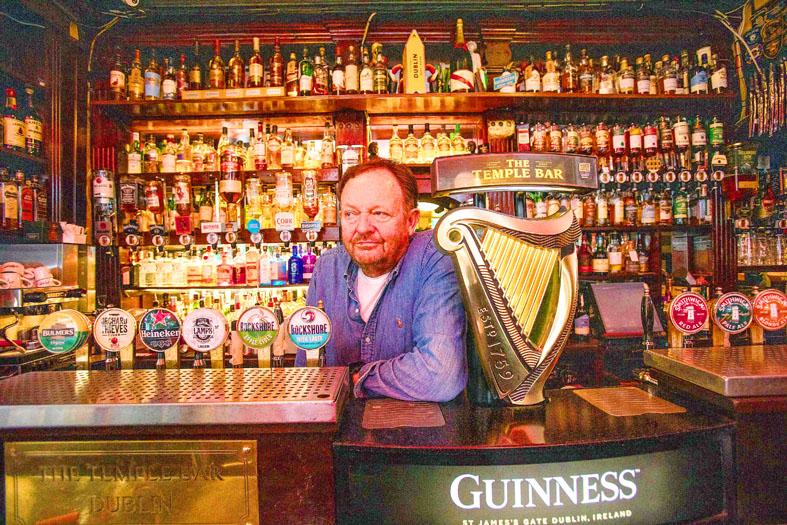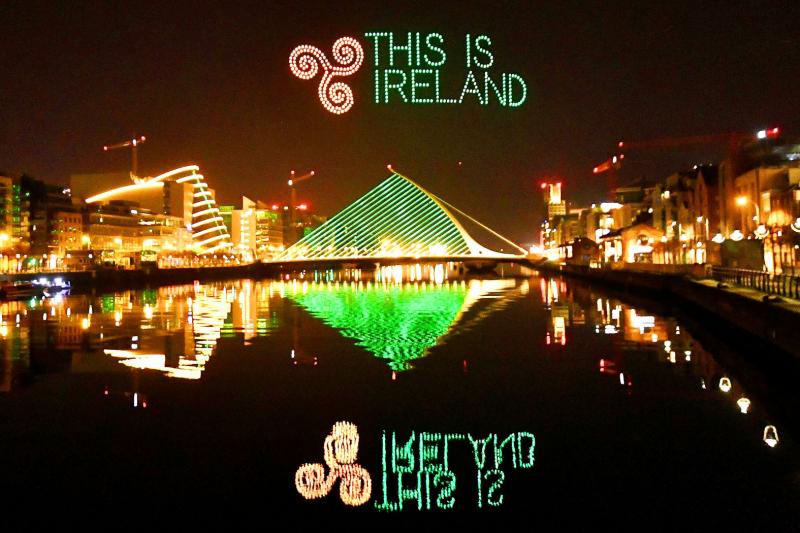The cellar of The Temple Bar in central Dublin would normally be stacked head-high with enough kegs of Guinness to serve thousands of pints to revelers toasting Ireland’s patron saint.
However, on St Patrick’s Day yesterday, only a smattering of empty caskets lined the chilled basement of the crimson-colored pub, the cornerstone of the capital’s drinking district.
For the second year in succession, the normally raucous celebrations have been canceled by COVID-19 restrictions.

Photo: AFP
“It’s a year on now and ... we seem to be back where we started,” said publican Tom Cleary, perched on a barstool next to a Guinness tap fashioned in the shape of a Celtic harp. “It’s sad there’s no end in sight. I mean: Will we be here next St Patrick’s Day with the same problems?”
St Patrick’s Day is traditionally a bonanza trading day for publicans across the Republic of Ireland.
Huge crowds heave into city centers on the national holiday, jamming pubs cheek by jowl and spilling out into the streets in an alcohol-fueled, shamrock-themed celebration of the Emerald Isle.

Photo: Reuters
However, the COVID-19 pandemic has brought Ireland’s most emblematic industry to a grinding halt.
The Irish government asked all pubs to cease trading after March 15 last year — just 24 hours before “Paddy’s Day.”
The nation is currently in the middle of its third lockdown.
As infections waned last year, pubs in some counties and those serving food were permitted to open for short spells.
However, cases surged after the government loosened restrictions ahead of Christmas.
All pubs nationwide have now been shut since Christmas Eve and the government said they are unlikely to reopen until the middle of summer.
“We’ve endured the longest most severe lockdown in Europe,” said Donall O’Keeffe, head of the Licensed Vintners’ Association, which represents pubs in Dublin. “When you’ve been closed for a year, every day is an eternity.”
In Ireland pubs and pints hold a semi-mystical status, and there are signs that drinkers have sought to recreate the magic at home during the pandemic.
Irish police have raided numerous shebeens — illicit unlicensed bars operating below the radar while the nation has been in lockdown.
Images from one show a ramshackle setup: a wooden bar with a single tap assembled under a corrugated metal roof.
Others are more convincing stand-ins for the real thing.
One raided on New Year’s Eve even had a pool table, a woodburning stove and an arcade machine perched in the corner.
More broadly there are signs of discontent in Ireland as the lockdown stretches on, with a sluggish vaccine rollout hampered by supply issues across the EU.
Last month, a protest against the lockdown that drew hundreds of people in central Dublin turned violent.
Protesters shot fireworks at riot police, who charged the crowd with batons drawn.
However, the protest quickly evolved from clashes with police into a party atmosphere, with live music and drinking in the street.
Further protests were scheduled yesterday, with fears that moods of merriment would be replaced by scenes of violence.
Police said that “checkpoints will be in place on arterial routes into the city” with dog units, riot police, horseback officers and a helicopter unit on standby.
Outside The Temple Bar — which lends its name to Dublin’s famed “Temple Bar” drinking district — the cobbled streets are framed by desolate pubs.
Some have had their windows boarded up for months, settled in for another year of muted St Patrick’s celebrations and a long lockdown with no end in sight.
“The mood is sombre,” said Martin Harte, head of the consortium which oversees the district.
“I don’t think anyone is thinking that we’re going to open soon and people are ... fearful and unsure,” Harte said.

‘SHORTSIGHTED’: Using aid as leverage is punitive, would not be regarded well among Pacific Island nations and would further open the door for China, an academic said New Zealand has suspended millions of dollars in budget funding to the Cook Islands, it said yesterday, as the relationship between the two constitutionally linked countries continues to deteriorate amid the island group’s deepening ties with China. A spokesperson for New Zealand Minister of Foreign Affairs Winston Peters said in a statement that New Zealand early this month decided to suspend payment of NZ$18.2 million (US$11 million) in core sector support funding for this year and next year as it “relies on a high trust bilateral relationship.” New Zealand and Australia have become increasingly cautious about China’s growing presence in the Pacific

Indonesia’s Mount Lewotobi Laki-Laki yesterday erupted again with giant ash and smoke plumes after forcing evacuations of villages and flight cancelations, including to and from the resort island of Bali. Several eruptions sent ash up to 5km into the sky on Tuesday evening to yesterday afternoon. An eruption on Tuesday afternoon sent thick, gray clouds 10km into the sky that expanded into a mushroom-shaped ash cloud visible as much as 150km kilometers away. The eruption alert was raised on Tuesday to the highest level and the danger zone where people are recommended to leave was expanded to 8km from the crater. Officers also

The team behind the long-awaited Vera Rubin Observatory in Chile yesterday published their first images, revealing breathtaking views of star-forming regions as well as distant galaxies. More than two decades in the making, the giant US-funded telescope sits perched at the summit of Cerro Pachon in central Chile, where dark skies and dry air provide ideal conditions for observing the cosmos. One of the debut images is a composite of 678 exposures taken over just seven hours, capturing the Trifid Nebula and the Lagoon Nebula — both several thousand light-years from Earth — glowing in vivid pinks against orange-red backdrops. The new image

ESPIONAGE: The British government’s decision on the proposed embassy hinges on the security of underground data cables, a former diplomat has said A US intervention over China’s proposed new embassy in London has thrown a potential resolution “up in the air,” campaigners have said, amid concerns over the site’s proximity to a sensitive hub of critical communication cables. The furor over a new “super-embassy” on the edge of London’s financial district was reignited last week when the White House said it was “deeply concerned” over potential Chinese access to “the sensitive communications of one of our closest allies.” The Dutch parliament has also raised concerns about Beijing’s ideal location of Royal Mint Court, on the edge of the City of London, which has so